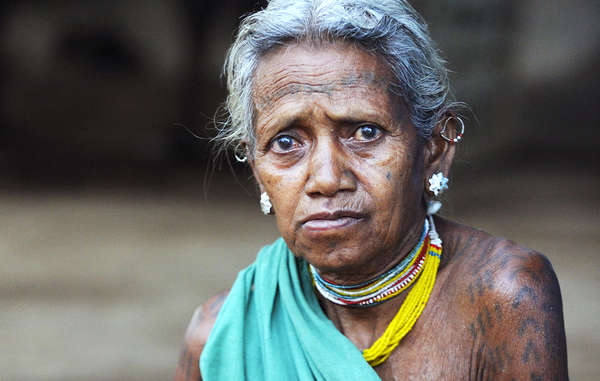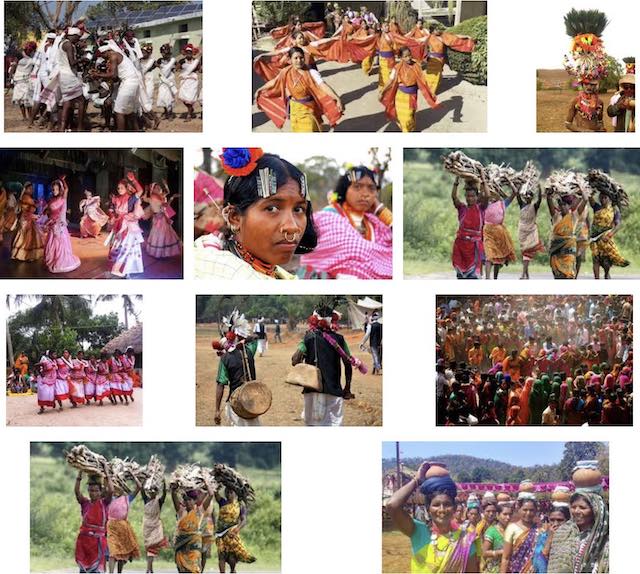
Photo © Outlook Magazine >>
3. The Baiga have restored over 600 acres of forest around just one village
In the village of Dhaba in central India, Baiga tribal villagers became concerned that the local forest department were cutting down too many trees, supposedly to stop the spread of a pest. They protested and physically intervened, placing themselves between the forest officials and the trees.
Their protest succeeded, and now several tree species like the char, mahuli, and bamboo have regenerated around the village. The Baiga planted many of the trees themselves.
Source: Earth Day: Eight amazing facts that prove tribal people are the best conservationists – Survival International
Address: https://www.survivalinternational.org/news/11667
Date Visited: 17 March 2022
From being tiger worshippers to guardians of the wildlife, the Baiga tribe of Madhya Pradesh are playing a vital role in tiger conservation by helping forest officials in providing protection to the big cats and other wild animals living in the Kanha National Park.
Members of the Baiga tribe, a semi-nomadic tribe of central India that is reliant on the forest, had been living in 28 villages within the Kanha National Park until 1968, after which they were relocated. […]
Source: “Tribals Join in Tiger Conservation in Kanha National Park”, Outlook Magazine, 19 June 2016
Address: http://www.outlookindia.com/newswire/story/tribals-join-in-tiger-conservation-in-kanha-national-park/943927
Date Visited: Mon Apr 24 2017 15:59:40 GMT+0200 (CEST)
“Tribals are subject to oppression and cruelty even after independence and still picked up by the investigating officers to cover up shoddy investigations.” – D.Y. Chandrachud (Chief Justice of India since 9 November 2022) quoted in “Members of De-Notified Tribes Picked Up to Cover Up Shoddy Investigations” | Learn more >>
India’s Forest Rights Act recognizes tribal communities’ rights to remain on their land and harvest its resources, even when it’s turned into a conservation zone. Yet these rights are continually violated, and many tribespeople are unaware they even exist.
But there is hope. Survival is working with partners on the ground to ensure India’s tribal people are informed of their rights. We are campaigning to prevent further evictions from tiger reserves and are supporting those seeking redress for past injustices.
Source: Tiger Reserves, India, Background Briefing, Survival International
Address: https://www.survivalinternational.org/about/tigers
Date Visited: 17 March 2022
In the last five years, there have been two deaths due to tiger attacks. Kanha Tiger Reserve, located in the Maikal ranges of the Satpuras is spread over Mandla and Balaghat districts of MP. According to National Tiger Conservation Authority (NTCA) website, this Kanha Tiger Reserve with an area of 2,074 sq km — 940 sq km of it being the national park and 1,134 sq km being the buffer zone.
Source: MP: ‘Terrorised’ by tiger, tribals near Kanha back on tantric ritual, Hindustani Times, 26 June 2016
Address: https://www.hindustantimes.com/bhopal/mp-terrorised-by-tiger-tribals-near-kanha-back-on-tantric-ritual/story-EX4mPWRhqj8jYVoNZfVKvM.html
Date Visited: 17 March 2022
Up-to-date reports by Indian experts and journalists
Search tips
Combine the name of any particular state, language or region with that of any tribal (Adivasi) community.
Add keywords of special interest (music, poetry, dance just as health, sacred grove and biodiversity); learn about the rights of Scheduled Tribes such as the “Forest Rights Act” (FRA); and the United Nations “Declaration on the Rights of Indigenous Peoples”, “Universal Declaration of Human Rights”, “women’s rights”, or “children’s right to education”.
Ask a question that includes “tribal” or “Adivasi”, for instance: “Adivasi way of life better?” (or “tribal way of life worse?”)
Specify any particular issue or news item (biodiversity, bonded labour and human trafficking, climate change, ecology, economic development, ethnobotany, ethnomedicine, global warming, hunter-gatherers in a particular region or state, prevention of rural poverty, water access).
For official figures include “scheduled tribe ST” along with a union state or region: e.g. “Chhattisgarh ST community”, “Himalayan tribe”, “Scheduled tribe Tamil Nadu census”, “ST Kerala census”, “Particularly Vulnerable Tribal Group Jharkhand”, “PVTG Rajasthan”, “Adivasi ST Kerala”, “Adibasi ST West Bengal” etc.
In case the Google Custom Search window is not displayed here try the following: (1) toggle between “Reader” and regular viewing; (2) in your browser’s Security settings select “Enable JavaScript” | More tips >>
Note: hyperlinks and quotes are meant for fact-checking and information purposes only | Disclaimer >>
List of websites covered by this Google custom search engine
Academia.edu (platform for academics to share research papers) – www.academia.edu
Archive.org – https://archive.org
Centre for Science and Environment – https://www.cseindia.org
Current Conservation – https://www.currentconservation.org
Development and Cooperation (D+C) https://www.dandc.eu
Down To Earth (India) – www.downtoearth.org.in
India Environment Portal – www.indiaenvironmentportal.org.in
Harnessing Nature Magazine – https://harnessingnature.online
Mongabay-India – https://india.mongabay.com
M S Swaminathan Research Foundation – www.mssrf.org
Navdanya (protecting India’s biodiversity based food heritage) – https://navdanya.org
Third World Network (Penang, Malaysia) – https://twn.my
The Shola Trust (nature conservation in the Nilgiri region) – www.thesholatrust.org

Indian online periodicals and platforms | Images view >>
~ ~ ~
Personalize your CustomSearch by combining other search words >>
(e.g. name of a tribal community and region, a craft, or dance and puppetry)
Research the above issues with the help of Shodhganga: A reservoir of theses from universities all over India, made available under Open Access >>
Note: hyperlinks and quotes are meant for fact-checking and information purposes only | Disclaimer >>
See also
Accordweb.in | Accord | Articles by co-founder Mari Marcel Thekaekara | Shola Trust
Atree.org | Ashoka Trust for Research in Ecology & the Environment (posts)
Climate change | Audio | The Climate Question (BBC Podcast)
Environmental history and what makes for a civilization – Romila Thapar
Equations blog (Equitable Tourism Options)
Information provided by Indian government agencies and other organizations (FAQ)
Nature and wildlife | Crocodile | Elephant | Tiger | Mangrove forest | Trees
PARI’s tales from tiger territory | People’s Archive of Rural India (PARI)
United Nations on climate change
What is the Forest Rights Act about?
Who is a forest dweller under this law, and who gets rights?